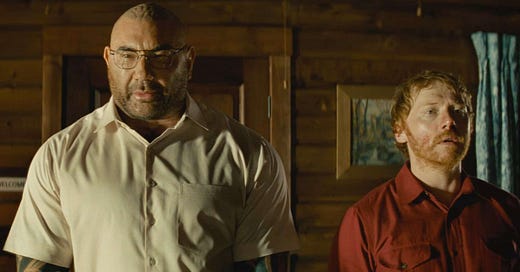Knock at the Cabin
The most surprising thing about Shyamalan's latest is how unsurprising it is.
Director M. Night Shyamalan has long been associated with the “plot twist” in film, and for good reason; nearly every film he’s directed has featured a major reveal or heel-turn deep in the third act.
For the last decade, however, his penchant for the late-stage “gotcha” has felt more like a bad habit than a refined trademark. From Split’s final seconds announcing its nature as a backdoor sequel to Unbreakable to Shyamalan himself being revealed as an arm of the secret puppetmaster organization in Old, the filmmaker has seemingly devolved from “master of surprise” to “butt of the joke.”
But this compulsion for twists is precisely what makes Knock at the Cabin—a film with no real surprise—his most surprising film in years.
Eric (Jonathan Groff) and Andrew (Ben Aldridge) are enjoying vacation with their daughter Wen (Kristen Cui) at a cabin in the woods when they are paid an unexpected visit by four strangers carrying makeshift weapons—Leonard (Dave Bautista), Redmond (Rupert Grint), Sabrina (Nikki Amuka-Bird), and Adrian (Abby Quinn)—who claim to have had a shared vision showing them that Eric, Andrew, and Wen hold the key to saving humanity from imminent destruction.
In order to save billions from an onslaught of apocalyptic plagues, the family must choose one of their own to sacrifice. No running, no suicide—a choice must be made by the following day, or everyone on the planet dies. According to these four nutjobs with gardening tools, anyway.
As hinted at previously, one of Knock at the Cabin’s most interesting traits is how cut-and-dry it is compared to the director’s previous work. It maintains an appropriately high-concept premise a Shyamalan film, but this is the first of his in a long time (maybe ever) where I was never surprised, not even for a second, by the trajectory of the plot. Not even in superficial ways. The story that the trailer teased for me, and the premise laid out by its cast in the opening act, is exactly what I ended up getting. No smoke and mirrors, no absurdly convenient omissions of critical information—just a thriller about life-and-death choices with thematic gestures about what it really means to put family first.
Experiences may vary, of course, depending on the conclusions you naturally draw from the setup. But personally, I never once felt misdirected, fooled, or outsmarted by where Shyamalan took the story. It ended up, essentially, exactly where it told me it was heading. That’s neither a good nor a bad thing, necessarily, but it’s certainly unusual for one of his movies, and it’s what sticks with me most.
We spend the bulk of the film in the cabin with Eric and Andrew as they grapple with the decision thrust upon them. Surely, they rationalize to one another, these people are delusional. Nothing good has ever come from people meeting over shared delusions on virtual message boards. Groff and Aldridge offer a thoroughly emotional portrayal of made-for-each-other lovers caught in the worst of circumstances with a horrible decision ahead of them.
Their self-assurance is made all the more difficult by the strangers’ convincingly earnest pleas to believe them. All four strangers are filled with heart and turmoil by their respective actors, as they bear the weight of delivering this ultimatum to this unfortunate family. Bautista especially stands out as a 2nd grade teacher and coach who can barely stand the thought of causing such pain to young Wen.
As Eric and Andrew struggle to devise escape plans and grapple with the possibility of having to actually follow through with this decision, Shyamalan periodically shows us glimpses into their life together—early stages of their relationship, hardships along the way, their adoption of Wen—a protracted “flashing before the eyes” of a life fought-for and well-lived. It’s a nice touch that gives us a stronger sense of their bond without bloating the film with backstory.
Still, sometimes I found myself wishing the film made better use of the smaller character details that it decided to introduce. It’s established that Andrew is the hothead to Eric’s even keel, and that they balance each other out well as a result. This is certainly evidenced in their behavior throughout the film, but there isn’t necessarily a payoff or reason shown why that needed to be their dynamic. Similar details are given to the four strangers, and likewise, their performances make sense given their backgrounds, but little results from the differences between their personalities or lifestyles.
And that may be what holds the film back; Shyamalan’s meta twist in making a totally straightforward thriller sufficiently bucks his annoying need to subvert expectations with silly curveballs, but in doing so, he struggles to fill the empty space left by his gimmick with meaningful storytelling or memorable thrills. It’s compelling enough for the duration, thanks to strong acting across the board, but it likely won’t stay with you beyond the theater parking lot.
It’s interesting to think about where Shyamalan might go from here. His next film, Labor of Love has the makings of a sobering drama about grief. Will he find a way to cram a characteristically left-field twist in there? Or is Knock at the Cabin a proclamation that he is now free of that self-imposed shackle? Whatever he does, I just hope it’s interesting. Good or bad, it usually is.





